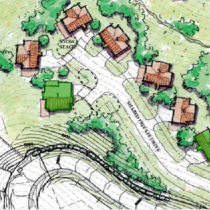Landscape Architecture for Landscape Architects › Forums › PROFESSIONAL PRACTICE › State of the Profession
- This topic has 1 reply, 39 voices, and was last updated 12 years, 9 months ago by
 nca.
nca.
-
AuthorPosts
-
August 19, 2010 at 6:42 pm #170033
 allandParticipant
allandParticipantPublic work: Banks dont lend, developers dont spend = no work for any design professionals,(much less or more, LAs).
Private work: Hard to spend on improving your residence’s landscape when you’re tying to put food on the table. Clients become the more fortunate or the money markets still intact after the meltdown…
just my 2 cents..
August 19, 2010 at 8:10 pm #170032 allandParticipant
allandParticipantPS
Dont interpret my post as flippant, as the downturn has caused as much pain and soul searching as all of us. I wish it wasnt
this way right now, believe me. Everything has been touched by the recession.I think Land 8 has become one thing we never thought.
THERAPEUTIC i hope the spelling is correct…
August 21, 2010 at 11:02 pm #170031 Leslie B WagleParticipant
Leslie B WagleParticipantI don’t know that I can address the original question, as I just don’t know the degree of layoffs or level of projects people still working manage to find or how they find them (in central NC). However, job postings are almost nil except for a couple that have appeared recently in the Charlotte area. I feel badly for new grads, but I went through an environment like this when I first came into the profession in 1974, and had a rough mid-life “bump” again in 1992, both layoffs from architectural firms. In between, I had my own business and after the second one, was fortunate (in a way) go get into government. Now I’ve retired from the latter on the early side, but those final years were as a plan reviewer, not really getting to design, and even in my own earlier business, it was a struggle. Looking back, there was nothing I wanted to do nearly as much, but two things seem really troubling that I don’t know an answer for. This is not meant to discourage anyone, just to share reality.
One, we are still considered “optional” and are STILL (30+ years after I was in school) having to explain our value and I see ads on the web like one recently that I’m sure was quite innocently written. It said, essentially, “we’ve got all our retaining walls and water features in now and just need a landscape architect to complete it.” How can we change this image of where we fit into the process?
As a planner in my last position, I got to see everything that needed review in a fairly good-sized city for over 15 years, that required the landscape (planting) ordinance. That meant all commercial, multifamily, industrial, and even some single family if special zoning conditions applied. The staff with planning backgrounds were supportive, but politically they could never strengthen the ordinance over the objections of the local building lobby to preserve trees or affect grading in any way. Also from what I saw, the submissions were for the most part submitted by engineering firms who charged for it, but used untrained staff and furnished an unimaginative approach of just “supplying the numbers,” so even an ordinance did not produce work for the profession. Furthermore, owners didn’t seek out LA’s as separate consultants, either. I’d say that the local university and hospital complex (and at times new industries in the one high-standards industrial park) were the only clients that provided work, and even then the designers were out of town firms. Which is fine, but brings me to my second point.
What kind of “wore me out” in the field was the need for never ending prospecting/selling aspect, which many of us are just not inclined or gifted naturally to do. And it never got any better. It seemed that (and I don’t know a solution to this) by the time I would hear of a project, the connections were already made. Even doing good work, although it led to some referrals, didn’t generate a real surviving “flow” for middle class existence. What I did for the larger checks was low-income housing site plans (group and elderly complexes and apartments) subbing for an architect. I think that work is extinct now, and it was grueling because the program required completion of all approvals (HUD and local) before projects were allowed to “close” and pay the consultants….a process that required 18 to up to 36 months on average. In between, I supplemented with private residential.
I admit that private residential might have been going on in the city, which I wouldn’t have seen at the planning desk. But I guess all I am saying is, this is a profession you have to love and I hope everyone who truly does finds a way to stay in it. But those who have gone before you weren’t “asleep at the wheel.” They faced many of the same things and I have a feeling that we are still just like a “third political party” that has something to say, but has to keep re-qualifying and taking out petitions over and over to just stay on the ballot. At some point, maybe we will make it over those breakers like Tom Hanks in that survival movie. Sorry, I guess this didn’t add much in the way of answers.
August 22, 2010 at 7:27 pm #170030 BoilerplaterParticipant
BoilerplaterParticipantPlease don’t be sorry. I think it added some valuable points to the discussion.
Look around…there are a lot of people wondering if the middle class will survive this recession.
August 23, 2010 at 7:29 pm #170029John.Dallinga
ParticipantI must say I both agree and disagree (best way to say nothing at all, right?).
I currently work very closely with the landscape contractors and many are locals who have grown up cutting grass, planting trees, shrubs, and flowers, and maintaining peoples’ properties. Many of them pick up the difference between a rose and an azalea and, through trial and error, figure out which one grows best under what conditions. Walk into any good nursery and you’ll find a horticulturalist who can tell you the same thing. A homeowner with a green thumb can also figure these things out by putting in the time and effort on their own.
An architect or engineer can easily create a simple and successful plant palatte for a site or development, assuming they give trees enough room among sidewalks and utilities or keep contractors from piling up the mulch ‘volcanoes’ they’ve become famous for. True, we may not like it, but if ordinances allow for it, we get to swallow it. The smart firms will staff an LA to avoid too many revisions based on planning commission reviews, but others will choose against it. We can argue our necessity, but we aren’t vital.
The key is to find the areas where we ARE vital. Perhaps I have the luxury of receiving my BLA at a school whose emphasis was sustainability from the get-go. Our profession is shifting rapidly towards issues of stormwater management, retention, water quality, multi-use, sustainable design (not exclusively restoration), and urbanism/suburban retrofitting to name a few. These are the issues we must confront. These are the solutions we need to make more attractive and cost beneficial to our communities. Our mark will not be made by specializing in plants alone. We need to show that we know where to use them, how to use them, and why to use them. We need to show that we can use materials sustainably and apply that knowledge both to buildings and their sites. We don’t need to know every hydraulic curve or structural load calculation, but we need to know enough to sit at the table and engage in the conversation.
Yes, our profession is broad. Yes, many of our predecessors have dropped the ball, but there are plenty who have picked it up and are edging ahead of architects and engineers, but doing it collaboratively. They are proving their worth in cities and regions around the world. Maybe it’s time to let the general public figure out how good (or bad) Joe Schmo landscaper is and focus on the things that are going to matter beyond the next planting season. Maybe then they’ll realize what quality design is.
Make like a tree and adapt! Get involved in the political process. Build our lobby, even if its at the local level. Create change. No one is going to do it for us.
August 26, 2010 at 3:54 pm #170028 landplannerParticipant
landplannerParticipantPlease also reply to the “Working or Not” discussion thread and update what is going on with you employment-wise, what you see in the way of economic activity (or lack thereof) in your region and your viewpoint on where things are headed in terms of employment trends for the design profession.
Thank you.
Landplanner
August 26, 2010 at 9:48 pm #170027 Tom EllenwoodParticipant
Tom EllenwoodParticipantAs of right now, I don’t believe anyone from my graduating class has found an LA position. Some have internships, but thats about as far as it goes.
September 1, 2010 at 2:53 pm #170026 Leslie B WagleParticipant
Leslie B WagleParticipantPlease overlook the “go get” typo in original post, meant “to get” 🙂
I’ve read the “are you employed or not” thread, and don’t really know where I would fit. I’ve kept my license up, but really wonder if I should, lately reading dire economic prophets that this recovery will take until 2016 or later. Being retired with at least basic comforts money, one answer would be “no” but I’m also working on providing plans and sketches that will go into a proposal (without pay) for a nonprofit that has been at least a mental challenge for the neurons, so that would be “a little”….although I don’t think it has a strong chance of getting approved for actual shovels in the ground.
Maybe the whole country isn’t as dead as around here, though. There are various openings at this site in case anyone looking desperately who can relocate isn’t aware of it:
http://jobs.oodle.com/landscape_designer/careers/architecture-desig…September 7, 2010 at 5:05 am #170025 earthworkerParticipant
earthworkerParticipantThe profession is a shell of its former self. LA’s are looking into other fields just to find any kind of work. Just look at the latest job postings on your local ASLA’s chapter website. It’s pitiful. I only wish my professors in college had told me that the profession gets wiped out every ten to fifteen years. Of course, none of them had stepped foot in a real office in decades so how could they know what the real world is like.
Currently, I see firms trying to lease portions of their buildings just to make their mortgages. A few in my region have consolidated with civil engineering firms and basically dissolved away. The offices that are still open have huge numbers of empty computers and drafting tables.
Right now, if you are a firm without government contracts, your back is against the wall. Is it any wonder EDAW merged with AECOM. Developers aren’t building because banks aren’t lending. Projects that are being constructed now were designed three years ago and new design work is not occuring. It will take years for this profession to get back to the boom times and things may never be as they were. Qualified principals and associates have been laid off and started their own practices and can now offer the same services as the large firms for half the cost (if anyone has a project for them). Does anybody out there have reason to believe this profession will bounce back in a year, two or ten? Our profession is unknown, unrespected and misunderstood. That makes our jobs and the work we love the first item on the chopping block. I don’t have time to wait for ‘advocacy’ of our profession to translate into a job. Just frustrated. Anyone else feel the same way?September 7, 2010 at 12:15 pm #170024 Leslie B WagleParticipant
Leslie B WagleParticipantSince putting my foot into this (above) I’ve been thinking about the deeper underlying questions below the “current crisis” (just as many Americans are doing about the overall state of the nation as discussions get past the bailout/stimulus etc. arguments).
I wonder if it’s like this. Although we wish we could have an intrinsic flow of work and know that there are real values we can add, the idea that our proper role has only been “interrupted” once again and will surely come some day may need to be questioned, much like oil dependence going on forever or some analogy. That just adds to the disillusionment and frustration.
I’m thinking about not exactly parallel but maybe comparable fields some of my friends and relatives have gotten into – one example being “art therapy.” This caused a sister-in-law huge outlays of time and energy to get a master’s degree, only to become used mainly in ways she didn’t relate to (although the institutions where she worked for awhile didn’t “mind” if she threw in art along the way with their clients). Once again, the field she wanted to practice was not an indefensible notion but was not well established or embraced in the real world, yet held highly in academia. I don’t think she even paid off the master’s degree before she dropped out of the field, such as it was/never was.
What if all along we had thought of ourselves as something more like, say, sculptors? The whole art of sculpture certainly hasn’t died off, and people study it and some of them even sell major works and support busy studios with assistants running around, complete with equipment, tools etc. in some warehouse. But admittedly a lot fall by the wayside or have to keep it going as a sideline.
Now, if you KNEW that was likely to be your competitive reality before going into it (and I seriously doubt many art schools imply you can count on making a living this way, although they are proud of their rare alumni who “make it big time”)….you might STILL go into it, but with less of an attitude that “society needs this and will surely recognize it” and more of a “there have been a few like Henry Moore and maybe I can’t duplicate that, but I want to dedicate my efforts come what may.” You’d know it was a kind of monastic calling, so to speak. The field goes on and doesn’t disappear and faculties still have students but it’s on a more (generally) honest basis, as a cultural “high calling” kind of thing. I dunno, maybe like being a children’s book author, screenwriter or music composer are other analogies.
We have this confusion because we could be part of the “built environment” and we see so much that needs improvement wherever we cast our eyes, that we imagine ourselves to have almost unlimited potential. But where society puts its resources is another entirely different equation. It will never, ever, build for the most part at an even moderately visionary level. Let’s say for perhaps it’s own valid reasons, It’s more temporary strip development-minded, not imposing master world campus minded; that way we would have a resolution to the puzzle that while good things do “happen,” it’s not a universe but a subset. Think about how most people fall far short of perfect health, even if that keeps health experts baffled because they know “how” we should eat, exercise. etc. Sometimes I sense their immense frustration with “the rest of us” (being one of those in the lesser achieving herd). It’s not that we don’t hear what they have to say but we run into problems we just can’t always jump over without great difficulty. Maybe even in the best of times, the resources are there in the minds of the idealists (if reallocated from other things we value less), but not really there according to the accountants, so to speak.
September 7, 2010 at 12:51 pm #170023 Leslie B WagleParticipant
Leslie B WagleParticipant(continuing, ha).
Ran out of edit time, but what I think I’m trying to say, is I’ll bet a typical sculptor doesn’t drive around and at every intersection, or in every park or in front of every new building, stop and wonder “why isn’t there a sculpture involved in that?” (There probably could be a lot more, but only a few get the artists huge rewards to install, whereas the money could be spread around better – a different issue). I’m just using the parallel for attitude contrast, because I think LA’s tend to believe that on every set of site plans, there should be an LA seal on them.
Ramblings of the mind for the day.
September 7, 2010 at 8:14 pm #170022 Leslie B WagleParticipant
Leslie B WagleParticipantI have an earlier post below so this is out of sequence but I just had to say yeah, about the 90’s…that was a horrible time and when I said I changed in ’92 the details were that I was laid off in early ’90 and it TOOK UNTIL ’92 to find something (also government). Environmental planning as an alternative however is close to nonexistent in most of the Southeast.
Not to get too redundant, but basically society has “survival” and “enhancement” sectors in the economy. Think of growing soybeans vs. wine grapes. Now, if you wanted to engage in a steadier market less in need of creative marketing (given the right climate etc.), which would you go into as a farmer? And which one would be less essential during a crisis? (Ignore the growth area of people who need to drown their sorrows, lol). Just like in our own family budgets in a choice between groceries and a private school, it’s not rocket science.
What a group in the enhancement sector CAN do with this basic truth (I noticed your comments on ASLA much higher up) is, it can organize such things as wine festivities and awards, wine tours and tastings, etc. and continually publicize itself through articles to raise general awareness and curiosity. This would be hopefully move the sector from “rare enhancement” towards the status of more “highly appreciated” …and I suppose that is the philosophy behind an organization of any profession lurking in the shadows. The prominent ones like engineers can engage in stronger tactics to take over emerging technologies, or even strong-arm weaker competitors.
I kind of hate it, but I’m thinking we can’t confuse the function of potatoes and fine herbs or tupperware and china, so to speak, or expect others to do the same. We may have to accept that publicity might raise the level of awareness on a sliding scale away from “frill” towards “desirable.” But our situation is a much greater challenge than just hoping for our influence will grow through some kind of mystical seismic shift.
September 15, 2010 at 7:03 pm #170021 Bob AtwoodParticipant
Bob AtwoodParticipantHere in Houston te picture isn’t very bright at all. New construction is very slim and residential market is terrible too.
Most firms here are down anywhere from 30% or more! I do see some signs of hope amongst firms doing work in Asia.
September 15, 2010 at 11:00 pm #170020 BoilerplaterParticipant
BoilerplaterParticipantAnd Texas was supposed to be in better shape economically! Seems like I see more ads for LAs there than anyplace else. I know many don’t believe that more government spending is the answer, but I’m thinking we’ll need a WPA-type program to get people working again. When the rate of indigence reaches a certain level, there is risk of riots, social unrest…that ends up costing dearly as well. The jobs to absorb all these displaced workers just aren’t coming along. Where are those people supposed to go?
September 28, 2010 at 1:04 pm #170019Brittany Brock Birdsong
ParticipantI just wanted to put in some two cents on my personal experience recently. I graduated in 08 and moved out to the Bay area with a job. Shortly thereafter, my company laid off all new employees and was hit dramatically by the recession. I have been working on and off freelance jobs and recently have relocated for a few months in Paris. I’m currently doing an internship at a young, innovative architecture firm. I was actually offered 2 internships from 2 interviews I went to, both at architecture firms. I want people to know that at least over here, design firms are busy doing projects in Morocco, Caribbean and the rest of Europe. I needed design experience and it’s good working so closely with architects and learning to think about the design process a slightly different way. Whether or not this will help me get a job when I return to the States, we will have to see!
-
AuthorPosts
- You must be logged in to reply to this topic.

